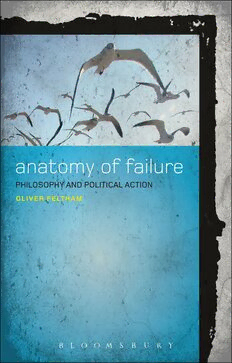Table Of ContentAnatomy of
Failure
Also available from Bloomsbury:
Alain Badiou: Live Theory, Oliver Feltham
Being and Event, Alain Badiou, translated by Oliver Feltham
Libertarian Anarchy, Gerard Casey
Anatomy of
Failure
Philosophy and Political Action
OLIVER FELTHAM
LONDON • NEW DELHI • NEW YORK • SYDNEY
Bloomsbury Academic
An imprint of Bloomsbury Publishing Plc
50 Bedford Square 175 Fifth Avenue
London New York
WC1B 3DP NY 10010
UK USA
www.bloomsbury.com
First published 2013
© Oliver Feltham, 2013
All rights reserved. No part of this publication may be reproduced or
transmitted in any form or by any means, electronic or mechanical,
including photocopying, recording, or any information storage or
retrieval system, without prior permission in writing from the publishers.
Oliver Feltham has asserted his right under the Copyright, Designs and
Patents Act, 1988, to be identified as Author of this work.
No responsibility for loss caused to any individual or organization acting
on or refraining from action as a result of the material in this publication
can be accepted by Bloomsbury Academic or the author.
British Library Cataloguing-in-Publication Data
A catalogue record for this book is available from the British Library.
EISBN: 978-1-4411-9954-6
Library of Congress Cataloging-in-Publication Data
Feltham, Oliver.
Anatomy of failure : philosophy and political action / Oliver Feltham.
p. cm.
Includes bibliographical references (p. ) and index.
SBN 978-1-4411-5864-2 (pbk.) – ISBN 978-1-4411-6088-1 (hardcover) –
ISBN 978-1-4411-6512-1 (epub) – ISBN 978-1-4411-9954-6 (ebook pdf)
I
1. Political science–Philosophy. I. Title.
JA71.F46 2013
320.01–dc23
2012030173
Typeset by Newgen Imaging Systems Pvt Ltd, Chennai, India
COnTEnTs
Acknowledgements vi
List of abbreviations vii
1 Thrasymachus versus Socrates on
philosophy and political action 1
2 1647 – The history of the Leveller-agitators
and the New Model Army 29
3 Hobbes’ and Locke’s metaphysics: Substances
no longer act, institutions act 87
4 Hobbes and Locke on religious conflict:
When institutions act, subjects act 131
5 Hobbes and Locke on politics:
Sovereign action and contractual action 181
6 Unveiling the forgotten model:
The Leveller-agitators on joint action 251
Notes 271
Bibliography 283
Index 287
ACknOwLEdgEMEnTs
This book is dedicated to Alma and Giulio, fruit of joint action,
partners who join new to old.
Many friends and colleagues have aided me in the long gestation
of this book, whether it was in a brief exchange at a conference
or through continual collegial support. Some of them have prob-
ably forgotten what they said when I unveiled this project to them,
but all contributions were valuable, and kept me going at different
points of the voyage. Having said that, the result is no one’s fault
but my own. In particular I would like to thank Bernard Aspe,
Bruno Besana, Vanessa Brito, Andrew Buchanan, Lorenzo Chiesa,
Justin Clemens, Mladen Dolar, Duncan Fairfax, Alexis Feltham,
Bryony Feltham, Chris Feltham and Val Feltham, Tony Fry,
Geoffrey Gilbert, Peter Hallward, Quentin Meillassoux, Alberto
Toscano, Steven Sawyer, Jelica Sumic Riha, Frank Ruda, Cameron
Tonkinwise, Tzuchien Tho and Ben Tunstall. The American
University of Paris supported me by means of a research course
release in the fall of 2010, and by providing a diligent research
assistant, Sophia Ben-Achour, for one semester. Sally Murray, my
librarian, did not give up on securing access to the Early English
Books Online database. Bloomsbury have demonstrated inestima-
ble patience and good will. Finally I thank my first reader, Barbara
Formis – if it had not been for that first conversation about praxis
in the café at the Bibliothèque Nationale Française, there would be
neither book, nor children, nor us.
LIsT OF
ABBREVIATIOns
Leveller-agitator tracts from the Thomason Tracts collection
AP An Agreement of the People
CA The Case of the Army Truly Stated
SE Ahe Solemn Engagement
PP Putney Projects
Books
B Thomas Hobbes, Behemoth or the Long Parliament
C Thomas Hobbes, On the Citizen
E Baruch Spinoza, Ethics
EHU John Locke, An Essay Concerning Human
Understanding
L Thomas Hobbes, Leviathan
LT John Locke, A Letter Concerning Toleration
ML Martin Luther, Martin Luther: Selections from His
Writings
PL A. S. P. Woodhouse, Puritanism & Liberty
(the Putney Debates)
R Plato, The Republic
ST John Locke, Second Treatise on Government
CHAPTER ONE
Thrasymachus versus
Socrates on philosophy and
political action
Origins
Thrasymachus is angry. He was allowed to figure in one of the
grand opening scenes of philosophy only to disappear into the
wings, a mere extra, yet he had come to declare a truth: that there
is no justice, no Idea of the good that might direct action. What
is called ‘justice’ is always what suits the stronger: ‘in all cities the
same thing is just, namely what is good for the ruling authority’.1
Power determines what is said to be right. Two millennia before
Hobbes or Marx, Thrasymachus insists that a theory of action
has to take into account political power and the possibility of jus-
tice being fiction. But Socrates and his acolytes are not ready; for
them this would result in a space of action without any orientation,
which is absurd. They overwhelm him with reproaches of incivil-
ity and arguments that beg the question, presuming the truth of
the very theory he is attacking. He gives ground reluctantly not
able to fully articulate and defend what is actually the germ of an
entirely different philosophy of action. And on the way he offers
the only complete diagnosis of Socrates’ tactics to be found in the
Platonic opus: Socrates is not an ironist, but a trickster. Athens’
self-appointed moral critic is stung by the attack; in response, his
sarcasm is violent, his rhetoric cheap and arguments rough and
flawed. Yet Thrasymachus is reduced to sulking and then silence.
After Book I of The Republic, we hear no more of him apart from a

